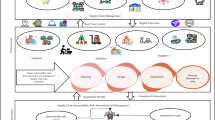Abstract
After the 9/11 terrorism attacks, the lock-out of the American West Ports in 2002 and the breakout of SARS disease in 2003 have further focused mind of both the public and industrialists to take effective and timely measures for assessing and controlling the risks related to container supply chains (CSCs). However, due to the complexity of the risks in the chains, conventional quantitative risk assessment (QRA) methods may not be capable of providing sufficient safety management information, as achieving such a functionality requires enabling the possibility of conducting risk analysis in view of the challenges and uncertainties posed by the unavailability and incompleteness of historical failure data. Combing the fuzzy set theory (FST) and an evidential reasoning (ER) approach, the paper presents a subjective method to deal with the vulnerability-based risks, which are more ubiquitous and uncertain than the traditional hazard-based ones in the chains.
Similar content being viewed by others
Explore related subjects
Discover the latest articles and news from researchers in related subjects, suggested using machine learning.References
P. Chapman, M. Christopher, U. Jüttner, H. Peck, R. Wilding, Identifying and managing supply-chain vulnerability, Logistics & Transport Focus, vol. 4, no. 4, pp. 17, 2002.
Z. L. Yang, S. Bonsall, W. Alan, J. Wang, Reliable container line supply chains — a new risk assessment framework for improving safety performance, WMU Journal of Maritime Affairs, vol. 4, no. 1, pp. 107–122, 2005.
M. U. Thomas, Supply chain reliability for contingency operations, Annual Reliability and Maintainability Symposium, pp. 61–67, WA, USA, 2002.
D. Garg, Y. Narahari, N. Viswanadham, Design of Six Sigma supply chains, Proceedings — IEEE International Conference on Robotics and Automation, pp. 1737–1742, Taibei, 2003.
R. R. Pai, V. R. Kallepalli, R. J. Caudill, M. C. Zhou, Methods towards supply chain risk analysis, Proceedings of the IEEE International Conference on Systems, Man and Cybernetics, vol. 5, pp. 4560–4565, 2003.
G. Svensson, A conceptual framework of vulnerability in firms’ inbound and outbound logistics flows, International Journal of Physical Distribution and Logistics Management, vol. 32, no. 2, pp. 110–134, 2002.
J. Wang, J. B. Yang, P. Sen, Multi-person and multi-attribute design evaluations using evidential reasoning based on subjective safety and cost analyses, Reliability Engineering and System Safety, vol. 52, no. 2, pp. 113–128, 1996.
J. B. Yang, D. L. Xu, On the evidential reasoning algorithm for multiple attribute decision analysis under uncertainty, IEEE Transactions on Systems, Man and Cybernetics — Part A: Systems and Humans, vol. 32, no. 3, pp. 289–304, 2002.
OECD, Security in maritime transport: risk factors and economic impact, Maritime Transport Committee of OECD Report, France, 2003.
P. Timmerman, Vulnerability, resilience and the collapse of society, Institute of Environmental Studies, University of Toronto, Toronto, 1981.
J. Weichselgartner, Disaster mitigation: the concept of vulnerability revisited, Disaster Prevention and Management, vol. 10, no 2, pp. 85–94, 2001.
H. T. Burns, P. Cordire, T. Eriksson, Security Risk Assessment and Control, Perpetuity Press Ltd., Leicester, UK, 2003.
A. Pillay, J. Wang, Technology and Safety of Marine Systems, Elsevier Science Ltd., Oxford, UK, 2003.
E. J. Henley, H. Kumarnoto, Probability Risk Assessment, IEEE Press, NY, USA, 1992.
W. Karwowski, A. Mital, Potential applications of fuzzy sets in industrial safety engineering, Fuzzy Sets and Systems, vol. 19, no. 2, pp. 105–120, 1986.
Author information
Authors and Affiliations
Corresponding author
Additional information
Zaili Yang received his BSc in Foreign Trade Transportation from Dalian Maritime University, China in 2001 and MSc in International Transport from Cardiff University, UK in 2003, respectively. Since 2003, he has been a PhD student in the School of Engineering of Liverpool John Moores University, UK. His research interests include risk assessment of container supply chains, in particular, subjective risk analysis using fuzzy set and Bayesian probability theories.
Jin Wang received his BSc in Marine Automation from Dalian Maritime University, China in 1983, MSc in Marine Engineering and PhD in Maritime Safety Engineering from the University of Newcastle upon Tyne in 1989 and 1994, respectively. He is Professor of Marine Technology at the School of Engineering of Liverpool John Moores University, UK.
Professor Wang’s major research interests include safety and reliability based design and operations of large marine and offshore systems.
Steve Bonsall received his BSc in Marine Science from Liverpool Polytechnic, UK in 1977 and PhD in Maritime Technology from Liverpool John Moores University, UK in 2001, respectively. He is currently the maritime programme coordinator and principal lecturer at the School of Engineering of Liverpool John Moores University, UK.
Dr. Bonsall’s major research interests include container terminal operations, container supply chains and developments in maritime leisure.
Jian-Bo Yang received his BEng and MEng degrees in Control Engineering at North Western Polytechnic University, Xi’an, China in 1981 and 1984, and PhD degree in Systems Engineering at Shanghai Jiao Tong University, Shanghai, China in 1987. He is Chair of Decision and System Sciences at the Manchester Business School, The University of Manchester, UK.
Professor Yang’s main research interests include intelligent decision analysis and support under uncertainties, multiobjective optimisation, system modelling, simulation and control with applications in both engineering and management systems.
Quangen Fang received his BSc in Navigation from Shanghai Maritime University, China in 1976 and MSc in Maritime Education and Training from World Maritime University, Sweden in 1991, respectively. He is currently a professor and Director of the Navigation Simulator Training Centre of Shanghai Maritime University, China.
Professor Fang’s major research interests include ship simulation, navigation studies and ship operations.
Rights and permissions
About this article
Cite this article
Yang, ZL., Wang, J., Bonsall, S. et al. A subjective risk analysis approach of container supply chains. Int J Automat Comput 2, 85–92 (2005). https://doi.org/10.1007/s11633-005-0085-2
Received:
Revised:
Issue Date:
DOI: https://doi.org/10.1007/s11633-005-0085-2




